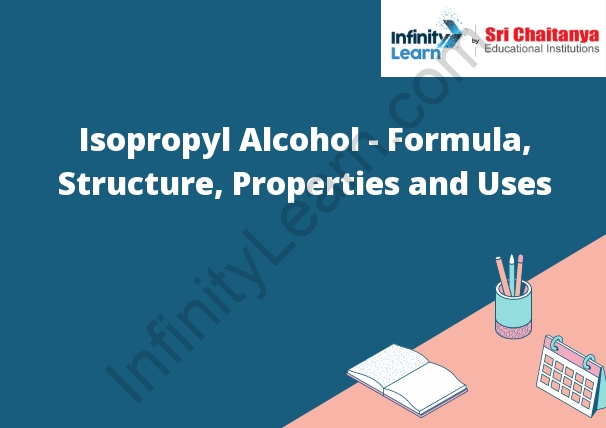Table of Contents
What is Isopropyl Alcohol?
Isopropyl Alcohol – Formula: Isopropyl alcohol is a colorless, flammable liquid with a slightly bitter taste. It is used as a solvent, as a cleaning agent, and as a fuel.
- Isopropyl alcohol, also known as isopropanol, is a colorless, flammable liquid with a slightly bitter taste. It is the simplest example of a secondary alcohol, meaning that it has two carbon atoms in its molecule. Isopropyl alcohol is miscible with water and isopropyl ether. It is produced by the hydration of propene, and is mainly used as a solvent and as a fuel.
- Isopropyl alcohol is a versatile chemical that has a wide range of applications. It is a good solvent for many organic compounds, and it is also effective in cleaning and degreasing metal parts. It is also used as a fuel for portable stoves and lamps, and as a component of antifreeze solutions.

Isopropyl Alcohol Chemical Formula: C3H8O
Isopropyl Alcohol is a colorless, flammable liquid with a characteristic odor. It is the simplest example of an alcohol, and isopropyl group is a propyl group substituted with a hydrogen atom. It is produced industrially by the hydration of propene.
Isopropyl Alcohol Structure
Isopropyl Alcohol’s chemical name is 2-Propanol. It is a colorless, flammable liquid with a slightly bitter taste. It is miscible with water and has a boiling point of 82.5 degrees Celsius. It is used as an industrial solvent and in rubbing alcohol.
Properties
Isopropyl alcohol is a colorless, flammable liquid that is used as a solvent and in rubbing alcohol. It is also used as a fuel additive. Isopropyl alcohol has a number of properties that make it useful.
- First, isopropyl alcohol is a solvent. This means that it can dissolve other substances. This makes it useful for cleaning purposes. It can also be used to dissolve other substances that can be used as ingredients in other products.
- Second, isopropyl alcohol is flammable. This means that it can be burned. This makes it useful as a fuel additive. It can also be used as a fire starter.
- Third, isopropyl alcohol is a good cleaner. This means that it can remove dirt, grease, and other substances from surfaces. This makes it useful for cleaning purposes. It can also be used to clean other substances that can be used as ingredients in other products.
- Fourth, isopropyl alcohol is a good disinfectant. This means that it can kill bacteria and other microorganisms. This makes it useful for disinfecting purposes.
Salting out
Salting out is a technique used in biochemistry to purify proteins. It is based on the fact that proteins and other hydrophobic molecules (like lipids) are soluble in water, but not in salt solutions. By adding a salt (like sodium chloride) to a mixture of proteins and water, the proteins can be separated from the other molecules because they will become insoluble in the salt solution. The salt solution can then be poured off, leaving the purified proteins behind.
Chemical Properties of Isopropyl Alcohol
Isopropyl alcohol is a colorless, flammable liquid with a slightly unpleasant odor. It is miscible with water and most organic solvents. It is a good solvent and isopropyl alcohol is used in a variety of industrial and commercial applications.
Isopropyl Alcohol Synthesis
The synthesis of isopropyl alcohol begins with the oxidation of propylene to propionic acid. This is accomplished by treating propylene with concentrated sulfuric acid at a temperature of about 350 degrees Celsius.
CH3-CH=CH2 + H2SO4 → CH3-CH2-COOH
Indirect Hydration
Indirect hydration is a process where water is introduced to the soil through irrigation. The water can come from rain, groundwater, or surface water. Indirect hydration can help to improve plant growth and increase crop yields.
Direct Hydration status
The patient is mildly dehydrated.
Isopropyl Alcohol Uses
Isopropyl alcohol is a solvent. It is used to clean surfaces, dissolve other substances, and to make other substances more soluble.
As Solvent
A solvent is a substance that dissolves another substance. The solvent can be a solid, liquid, or gas.
For Medical purpose
1. Make a mixture of 2 teaspoons of honey and 1 teaspoon of cinnamon powder. Take the mixture twice a day – once in the morning and once at night.
2. Make a mixture of 1 teaspoon of honey and 1/2 teaspoon of ground ginger. Take the mixture twice a day – once in the morning and once at night.
3. Take 1 teaspoon of honey with 1/2 teaspoon of lemon juice before breakfast.
4. Take 1 teaspoon of honey and 1/2 teaspoon of cumin powder before bedtime.
5. Mix 1 tablespoon of honey with 1/2 teaspoon of baking soda and take it before bedtime.
As an Anesthetic
- Technician, you will work with a team of health care professionals to provide anesthesia and related care to patients. You will be responsible for preparing the anesthesia equipment and drugs, and for monitoring patients during surgery.
- Anesthetic technicians must have a good working knowledge of pharmacology and anatomy, and be able to effectively monitor patients’ vital signs. They must also be able to work calmly and efficiently under pressure.
- Anesthetic technicians typically work in hospitals or clinics. They may work regular hours, or be on call to cover surgeries on short notice.
- The work can be physically demanding, as technicians must be able to lift and move patients. They must also be able to work long hours, and may be required to work overnight shifts.
Laboratory
- A laboratory is a facility that provides controlled conditions in which scientific or technological research, experiments, and measurement may take place.
- Laboratories used for scientific research take many forms, including research laboratories, testing laboratories, and quality assurance laboratories.







